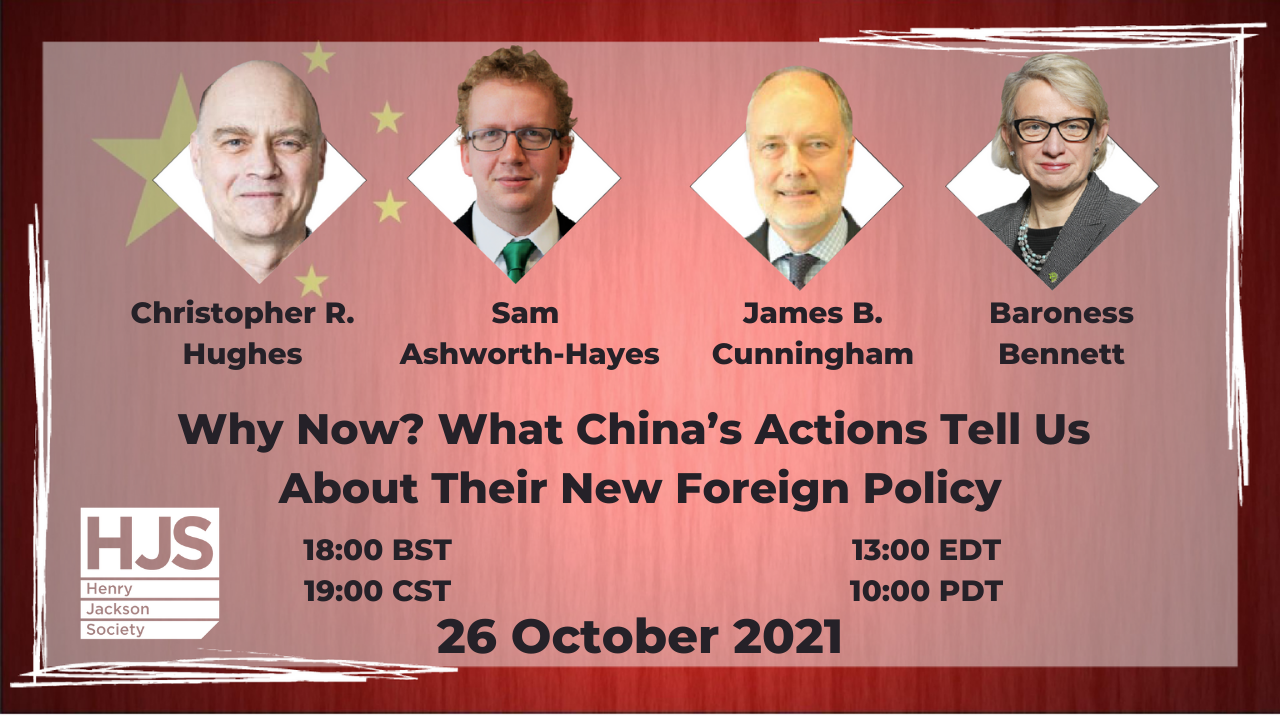Why Now? What Do China’s Actions Tell Us About Their New Foreign Policy

- This event has passed.
Why Now? What Do China’s Actions Tell Us About Their New Foreign Policy
26th October 2021 @ 6:00 pm - 7:00 pm

Only two years ago over one million Hongkongers took to the streets to demand the withdrawal of a bill which would have permitted extradition to mainland China. The protestors list of grievances grew. Protest and civil disobedience continued until early 2020 when Covid-19 brought mass gatherings to an end. It was under these circumstances, in June 2020, that Beijing imposed the National Security Law.
This move was the largest assault on the city’s autonomy since the 1997 handover and flew in the face of the Sino-British Joint Declaration. A chill immediately descended over Hong Kong with high-profile pro-democracy activists leaving for life in exile. The laws implications quickly became clear with books pulled from the shelves of public libraries and slogans criminalised. Activists were arrested and politicians barred from running for office.
While truly awful for those concerned about freedom in the Hong Kong, what does this crackdown tell us about China’s foreign policy? Clearly Xi Jinping is more prepared than his predecessors to secure China’s core interests whatever the backlash from the liberal democratic world may be. Yet Hong Kong was already under Chinese sovereignty, as such is it wise to draw conclusions from this about Xi’s approach to Taiwan and relations with the wider world. Moreover, if the changes in Hong Kong are symptomatic of an increasingly assertive foreign policy under Xi Jinping, how should the world respond?
To answer these and other questions, the Henry Jackson Society is pleased to welcome you to a fascinating discussion on China’s foreign policy.

Baroness Bennett was leader of the Green Party of England and Wales from 2012-2016, leading the party to a result in the 2015 general election that totalled more votes than in all of the previous general elections added together. As leader, she was also the first Green to take part in the national television debates that year.
Natalie was appointed to the House of Lords in September 2019, joining Jenny Jones to become the second Green peer. She’s also a member of the board of the European Green Foundation, so has regular contacts with Green parties across Europe. She is co-Chair of the All Party Parliamentary Group on Hong Kong. Alongside this she’s a champion of the universal basic income, and is particularly interested in food security and farming issues. Within the Green party she’s been an active worker on policy, on issues ranging from the abolition of the Corporation of the City of London to supporting the UN Sustainable Development Goals, proportional liability on the roads to ending all unnecessary single-use plastics, and the rights of asylum-seekers and sex workers.

James B. Cunningham served as ambassador to Afghanistan (August 2012 to December 2014), and as deputy ambassador (2011 – 2012). He was ambassador to Israel (2008 -2011), consul general for Hong Kong and Macau (2005 – 2008), ambassador and deputy permanent representative to the United Nations in New York (1999 – 2004), and acting permanent representative to the United Nations for the first nine months of 2001, including on 9/11.
After early tours in Stockholm, Washington, Rome, and the US Mission to NATO, NATO Secretary General Manfred Woerner selected Ambassador Cunningham as his chief of staff (1988 – 1990). He advised the Secretary General on all NATO issues in the context of nuclear disarmament in Europe, the collapse of the Berlin wall and the reunification of Germany, and the impending dissolution of the Warsaw Pact and the Soviet Union.
He is currently Chairman of CFHK, a consultant, an adjunct faculty member at Syracuse University’s Maxwell School and a nonresident senior fellow at the Atlantic Council.

Christopher R. Hughes is Emeritus Professor of International Relations at the London School of Economics and Political Science (LSE), where he also served as Director of the Asia Research Centre from 2002 to 2005. His PhD (from the LSE) was on the topic Taiwan and Chinese Nationalism: National Identity and Status in International Society and was awarded the British International Studies Association best thesis of the year prize for 1995. He teaches specialist courses in the International Politics of the Asia Pacific, Chinese Foreign and Security Policy and Foreign Policy Analysis.
His research focuses on the Asia-Pacific with special reference to Chinese foreign policy and politics, with monographs on Taiwan and Chinese Nationalism (Routledge 1997), China and the Internet: Politics of the Digital Leap Forward (edited with Gudrun Wacker, Routledge 2003) and Chinese Nationalism in the Global Era (Routledge 2006). He has various articles on Chinese politics and foreign policy, the international politics of the Asia Pacific, international relations theory and foreign policy in leading academic journals.

Sam Ashworth-Hayes is the Director of Studies at the Henry Jackson Society. Prior to joining HJS, Sam co-founded a startup using satellite imagery to support the installation of urban green infrastructure, raised funding and built a team to develop prototype products and deliver the first commercial trials. He has also previously worked designing field and lab experiments in behavioural economics, and as a journalist and researcher. Outside of academia Sam writes regularly for outlets including The Spectator, CapX, and National Review on economics and politics, and has made media appearances for the BBC, GB News, and Times Radio. He holds an MPhil in Economics from the University of Oxford, and a Bachelors in the same from the University of York.
***
EVENT SUMMARY
On the 26th of October 2021, Sam Ashworth-Hayes, Director of Studies at HJS, interviewed Baroness Bennett; an active lawmaker, James B. Cunningham; former US ambassador to Afghanistan, Israel and the United Nations, and Christopher R; Emeritus Professor of International Relations at the London School of Economics. Hayes began by discussing the National Security Law imposed on Hong Kong, which led to significant disruption and the measures taken in Britain to accommodate this. He further discusses the format of China’s foreign policy and its relations with the West, and the rest of the world.
Whilst discussing China’s politics, the panellists open up discussions and make valid points on China’s system of democracy, the negative effects of their contribution to climate change on their international relations with the rest of the world and compare US laws with China’s.
The discussion concluded on the sustainability of companies in China and the idea that although companies have previously made a lot of money in China, they will suffer in the future if they don’t choose to leave all together.
RELATED EVENTS
British General Election Campaigns 1830-2019: Can The Past Inform The Future?”
The British general election is the linchpin of our liberal democracy, and its results are often fundamental to how we live. With the next UK general election looming, there is therefore … Continued



